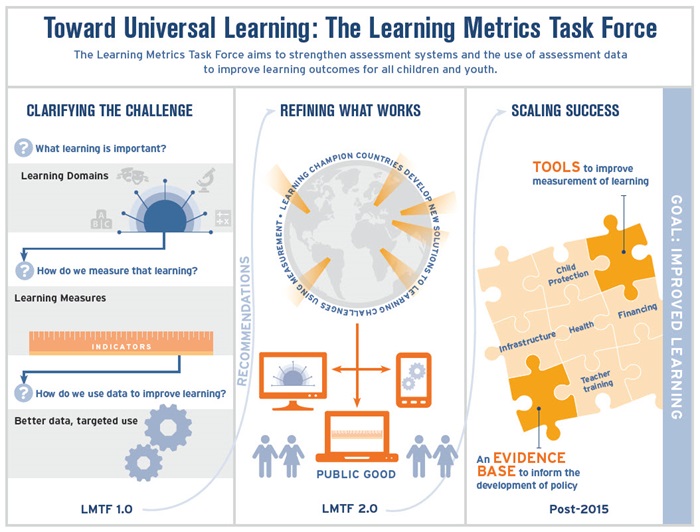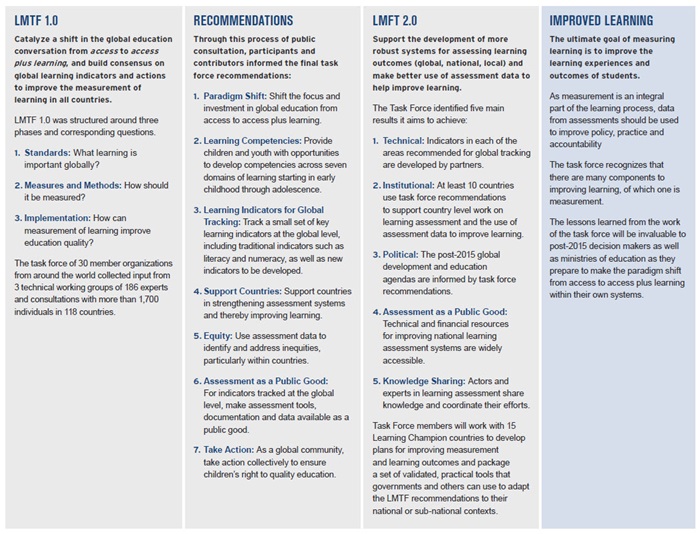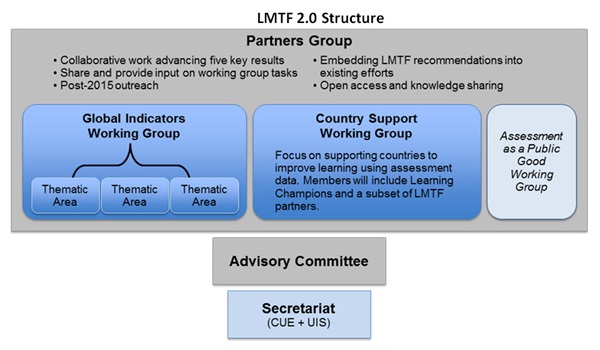LMTF 2.0
Having accomplished its main tasks in the first phase, the task force has decided to sustain the momentum built so far by embarking on a new phase (LMTF 2.0) over the next two years that sets out follow-up tasks, involves an expanded set of partners and focuses on bringing task force recommendations to life.
Whereas the goals for 1.0 focused primarily on shifting the global conversation from access to access plus learning and identifying indicators for global tracking, task force members agreed that there should be greater emphasis in 2.0 on improving assessment systems at the country level (national, local*). Without effective assessment systems, we cannot understand the extent of the global learning crisis and where to focus interventions to improve learning. Accordingly, the objective for LMTF 2.0 is to support development of more robust systems for assessing learning outcomes and better use of assessment data to help improve learning outcomes across the seven domains.
By the end of 2015, the task force aims collectively to achieve the following five key results:
- Technical: Indicators in each of the areas recommended for global tracking are developed by partners.
- Institutional: At least 10 Learning Champions use task force recommendations to support country-level work on learning assessment and use of assessment data to improve learning.
- Political: The post-2015 global development and education agendas reflect task force recommendations.
- Assessment as a Public Good: A strategy is developed for advancing an agenda in which student learning data is supported as a global public interest.
- Knowledge Sharing: Actors and experts in learning assessment share knowledge and coordinate efforts.
With a new set of tasks and actors, LMTF 2.0 requires a new organizational structure (see figure below), which includes a small advisory committee and an expanded partners group. UIS and CUE will continue to serve as the co-secretariat over the next two years, with UIS focusing on technical work and CUE focusing on institutional and political work, as well as overall facilitation. Initially there will be two working groups within the partners group — one focused on global indicators and one focused on country support — and a third working group on assessment as a public good will come together later. Within the working groups, LMTF partners will collaborate to advance work in a particular thematic area.


 LMTF 1.0
LMTF 1.0
With the release of recommendations in September 2013, the Learning Metrics Task Force laid out an ambitious agenda for global measurement of learning. For the first phase of work (LMTF 1.0), the objectives were to catalyze a shift in the global education conversation from access to access plus learning, and to build consensus on global learning indicators and actions to improve the measurement of learning in all countries. With a common commitment to a highly consultative process, the initiative was structured around three guiding questions:
- What learning is important globally?
- How should it be measured?
- How can measurement of learning improve education quality?
To answer these questions, the task force of 30 member organizations collected input from 3 technical working groups of 186 experts, consultations engaging more than 1,700 individuals in 118 countries, and a secretariat composed of staff from the UNESCO Institute for Statistics (UIS) and the Center for Universal Education at Brookings (CUE). Information about the process and results of LMTF 1.0 are archived here.
* “Local” refers to formative assessments in classrooms and other types of assessments used to capture the learning progress of children learning outside of the formal school system.